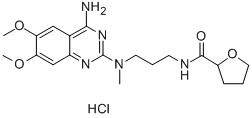| Alfuzosinhydrochloride |
|
| (CAS 81403-68-1) |
 |
| Description: |
Alfuzosin hydrochloride is an α1 adrenergic receptor antagonist used to treat benign prostatic hyperplasia (BPH).
Target: α1 adrenergic receptor
Alfuzosin, a new quinazoline derivative, acts as a selective and competitive antagonist of alpha 1-adrenoceptor-mediated contraction of prostatic, prostatic capsule, bladder base and proximal urethral smooth muscle, thereby reducing the tone of these structures. Consequently, urethral pressure and resistance, bladder outlet resistance, bladder instability and symptoms associated with benign prostatic hyperplasia are reduced. A limited range of clinical studies have shown oral alfuzosin to be more effective than placebo (in studies of < or = 6 months duration), to have sustained effects on long term administration (< or = 30 months), and to be comparable with the alpha 1-adrenoceptor antagonist prazosin, in the symptomatic treatment of benign prostatic hyperplasia.
Oral alfuzosin 7.5 to 10 mg/day in divided doses appears to be a promising first-line agent for symptomatic treatment of noncomplicated mild to moderate benign prostatic hyperplasia in patients with a high dynamic component to their obstruction. In addition, alfuzosin offers an alternative to prostatectomy (the current 'gold standard') in patients who require surgery but are unfit for this treatment, and in patients requiring symptomatic relief while awaiting surgery.
|
| Product No. |
KT20657 |
| Product Name |
Alfuzosinhydrochloride |
| Synonyms |
|
| Formal Name |
|
| CAS Number |
81403-68-1 |
| Molecular Formula |
C19H28ClN5O4 |
| Formula Weight |
425.91 |
| Formulation |
A crystalline solid |
| Purity |
98%min |
| Stability |
2 years |
| Storage |
-20°C |
| Shipping |
USD45 for Europe and USA. No shipping charge once amount reach USD500 |
| Quality Control |
HNMR,CNMR,LCMS,HPLC,IR,etc. |
| Price & Availability |
In Stock. Price Negotiated. |
|
| Related Products: |
((plusmn))-Bisoprolol hemifumarate Bisoprolol is a selective type β1 adrenergic receptor blocker.
Target: Adrenergic Receptor
Approved: July 31, 1992
Bisoprolol, on beta 1-adrenoceptor peptide induced autoimmune myocardial damage. In the animal model of autoimmune cardiomyopathy induced by active immunization of rabbits with beta 1-adrenoceptor peptide, bisoprolol was given at a dose of 3 mg/day throughout the study period. Our results showed high titer of anti-beta 1-adrenoceptor antibody in the immunized group throughout the study but not in the group receiving only bisoprolol [1]. Bisoprolol administration resulted in a significant reduction in HR reaching 60.3 +/- 1.4 bpm at VT of 500 mL (compared to 70.5 +/- 1.8 bpm with placebo, P < 0.001). Changes in HP were also significant with an increase in HP reaching 1004.5 +/- 22.2 msec at this controlled VT (compared to 860.3 +/- 21.5 msec with placebo, P < 0.001) [2].
Toxicity: Oral, mouse: LD50 = 100 mg/kg; Skin, rabbit: LD50 = 200 mg/kg; Skin, rat: LD50 = 500 mg/kg. Symptoms of overdose include congestive heart failure (marked by sudden weight gain, swelling of the legs, feet, and ankles, fatigue, and shortness of breath), difficult or labored breathing, low blood pressure, low blood sugar, and slow heartbeat.
|
|


